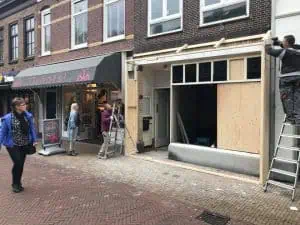An owner of a retail property has his property rebuilt, which increases its surface area. He agrees with the tenant that the rent nevertheless remains the same. If the owner subsequently finds out that his property can now yield much more rent, he wants to have the rent revised (increased). However, the court ruled that he had in fact agreed a rent reduction with the tenant by asking the same rent for a larger space and that at least five years must elapse before the rent can be revised again. The lessor then misses out on many euros in rent. What is the exact situation?
As early as 1974, a retailer enters into a lease agreement for the rent of a retail property with accompanying storage space. In 2014, the property will be renovated, increasing the surface area of the retail space by 26 square meters. It is agreed that the rent will remain the same. In 2015, however, the owner finds out out through a real estate agent that, given the booming property market, his property could now yield tens of thousands of euros more in rent per year. This is also not strange now that the retailer has been paying only steadily more rent since 1974. The owner then asks for a rent review.
On the basis of Section 7:303 of the Dutch Civil Code, it is possible for a landlord (or tenant) to request a rent review. This means that every five years, since the last rent determined by the parties has started or has been claimed in court (or after the end of the first rental period), the current rent can be checked against the average rent of comparable business premises in the area and, if necessary, the rent can be adjusted accordingly. The owner states that the rent was last adjusted in 2005. More than five years have elapsed since then, so the owner states that a rent review can now be carried out at a more market-based price.
The court ruled differently. Now that the refurbishment in 2014 has increased the retail space by 26 square meters, and the parties have agreed to leave the rent unchanged, a rent reduction has effectively been agreed, according to the court. After all, as a result of the expansion of the retail space, the retailer has paid no less than 15.5% less per square metre. Now that there has recently been a rent change introduced by the parties, the owner can only invoke the rent review from Section 7:303 of the Dutch Civil Code again after five years. Whether the rent has been increased or decreased in the past five years is irrelevant. In short, in this case the owner could not request a rent review again until 2019.
It is somewhat understandable that the owner made a mistake here. After all, the total rent was the same and did not seem to have changed. How could the owner have prevented this? The answer is quite simple. The owner should not have explicitly agreed with the retailer that the rent would not be increased. This concrete agreement is in fact the basis for the opinion that the parties have agreed on a reduction of the rent. The owner should therefore have requested a rent review immediately after the renovation without first agreeing with the retailer that the rent would remain unchanged.
As a landlord, do you want to request a rent review or are you, as a tenant, dealing with a rent review and do you have any questions about this? Please feel free to contact M2 Advocaten.
Lawyer Marius Rijntjes (rijntjes@m2advocaten.nl)

